

PBLWorks. 5 Ways Smart People Sabotage Their Success. Executive Summary Raw intelligence is undoubtedly a huge asset, but it isn’t everything.
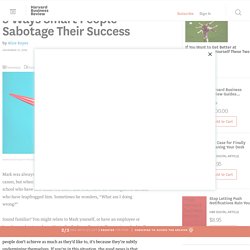
And sometimes, when intellectually gifted people don’t achieve as much as they’d like to, it’s because they’re subtly undermining themselves. Five things smart people tend to struggle with: Smart people sometimes devalue other skills, like relationship building, and over-concentrate on intellect. How Design Thinking Could Help Solve the Skills Gap. This story is the final in a six part editorial series exploring the balance between student learning and job skills.
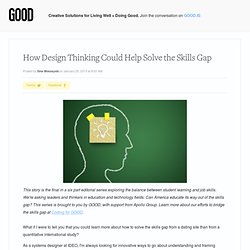
We're asking leaders and thinkers in education and technology fields: Can America educate its way out of the skills gap? This series is brought to you by GOOD, with support from Apollo Group. Learn more about our efforts to bridge the skills gap at Coding for GOOD. What if I were to tell you that you could learn more about how to solve the skills gap from a dating site than from a quantitative international study? As a systems designer at IDEO, I'm always looking for innovative ways to go about understanding and framing problems. The first technique is using analogous illustrations as a source for critical problem solving. ‘The Empathy Exams,’ by Leslie Jamison. “Empathy,” she writes, “means realizing no trauma has discrete edges.
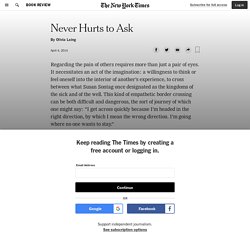
Trauma bleeds. Out of wounds and across boundaries. Sadness becomes seizure. Empathy demands another kind of porousness in response.” Course Gallery View Only – Boston Academics. Ask the Expert - IQ and Creativity testing for children. Q: My daughter is 3 years and 9 months old.
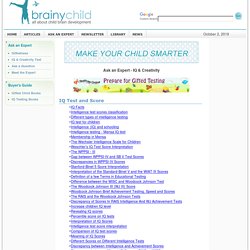
Since about a year ago she has displayed a great deal of artistic talent (at 2 yrs 9 months old she was drawing people with arms and legs and naming them). She draws pictures and labels them specifically, often asking how to spell the word so she can write it on the paper. Free multiple intelligences test young people 1. MI test intelligences descriptions 2. Multiple Intelligence Results. Intelligences multiples. Teaching critical thinking. Benjamin Bloom (1956) created this taxonomy or classification system for categorizing "competencies" in educational settings, as defined by skills demonstrated by learner type or intelligence.
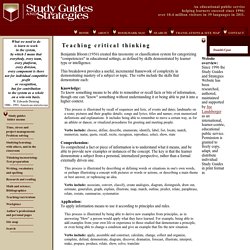
This breakdown provides a useful, incremental framework of complexity in demonstrating mastery of a subject or topic. The verbs include the skills that demonstrate each: Knowledge:To know something means to be able to remember or recall facts or bits of information, though one can "know" something without understanding it or being able to put it into a higher context. This process is illustrated by recall of sequences and lists, of events and dates; landmarks on a route; pictures and their graphic details; songs and lyrics; titles and names; even memorized definitions and explanations. Radical thinking. Are you looking for new ideas?
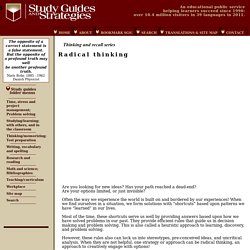
Has your path reached a dead-end? Are your options limited, or just invisible? Often the way we experience the world is built on and bordered by our experiences! When we find ourselves in a situation, we form solutions with “shortcuts” based upon patterns we have “learned” in our lives. Most of the time, these shortcuts serve us well by providing answers based upon how we have solved problems in our past. However, these rules also can lock us into stereotypes, pre-conceived ideas, and uncritical analysis.
Perhaps radical thinking may help you generate new ideas? First, briefly summarize your situation or challenge. Thinking like a genius: selected thoughts. Thinking like a genius: overview. Thinking and recall series Problem solving: creative solutions "Even if you're not a genius, you can use the same strategies as Aristotle and Einstein to harness the power of your creative mind and better manage your future.
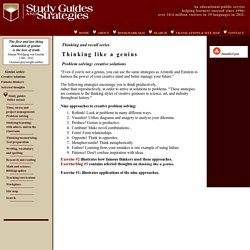
" The following strategies encourage you to think productively, rather than reproductively, in order to arrive at solutions to problems. "These strategies are common to the thinking styles of creative geniuses in science, art, and industry throughout history. " Theories about decision-making. What Multitasking Does To Our Brains. I can definitely understand how focusing on one task at a time allows you to be more productive.
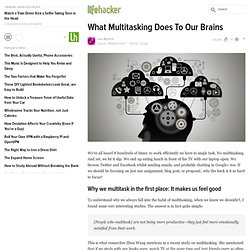
However, I also believe that you can benefit from taking a break after ~an hour of working on something, and then doing something else. Making progress on multiple different tasks in this way provides a similar feeling of high productivity, but also allows you to get a feel for exactly how much work you have on your plate. Obviously, not every task can be broken up into hour-long work sessions, but if I can diversify what I'm working on, I won't get bored of my work.In terms of making to-do lists, I've found that just making the old-fashioned, linear lists don't quite cut it for me anymore.
The Limits of Intelligence. Santiago Ramón y Cajal, the Spanish Nobel-winning biologist who mapped the neural anatomy of insects in the decades before World War I, likened the minute circuitry of their vision-processing neurons to an exquisite pocket watch.
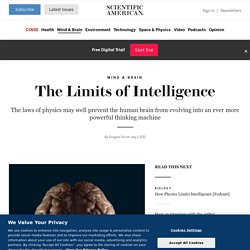
He likened that of mammals, by comparison, to a hollow-chested grandfather clock. Indeed, it is humbling to think that a honeybee, with its milligram-size brain, can perform tasks such as navigating mazes and landscapes on a par with mammals. A honeybee may be limited by having comparatively few neurons, but it surely seems to squeeze everything it can out of them. At the other extreme, an elephant, with its five-million-fold larger brain, suffers the inefficiencies of a sprawling Mesopotamian empire. Signals take more than 100 times longer to travel between opposite sides of its brain—and also from its brain to its foot, forcing the beast to rely less on reflexes, to move more slowly, and to squander precious brain resources on planning each step. The Feeling Wheel : Type A Lifestyle. How to Use “The Feeling Wheel” In my book I’m a Type A—How the Heck Will I Ever Retire?
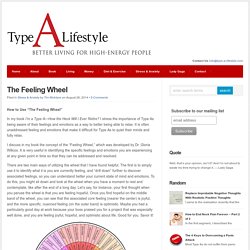
I stress the importance of Type As being aware of their feelings and emotions as a way to better being able to relax. It is often unaddressed feeling and emotions that make it difficult for Type As to quiet their minds and fully relax. I discuss in my book the concept of the “Feeling Wheel,” which was developed by Dr. Gloria Willcox. There are two main ways of utilizing the wheel that I have found helpful.
3 Secrets That Will Make You Emotionally Intelligent. Before we commence with the festivities, I wanted to thank everyone for helping my first book become a Wall Street Journal bestseller. To check it out, click here. Emotional Intelligence. It’s everywhere. They won’t shut up about it. How to Be Emotionally Intelligent. Photo What makes a great leader? Knowledge, smarts and vision, to be sure. How Much To Give And Take In Relationships – Kris Gage. Emotional boundaries are my big question right now I always have a big question in my head, and it’s always about love — and life.
After I broke up with my boyfriend of five years in 2014, my question was around “personal agency” and “real love” — specifically, whether someone can really love us if they see us differently (lesser and more superficially) than we see ourselves; if there is no “true” reality, then which version of “us” is real? 17 Emotional Intelligence Tests and Assessments. Exquisite Minds: Gifted and Creative Children « Support for Educators and Parents of Gifted and Creative Children "The problems that exist in the world today cannot be solved by the level of thinking that cr. The Nature Of Genius. Genius by L. James Hammond. Creativity across the life-span: A systems view. Csikszentmihalyi, M. Talent Development III, pp. 9-18 Gifted Psychology Press 1995 This article by Mihaly Csikszentmihalyi looks at three major issues related to creativity over a lifespan.
They are: what can be learned about creativity; a model of optimal aging; and how to work with creative children. The author based this work on six years of interviews with scores of older adults who are still actively creative. Unlocking the Mysteries of The Artistic Mind. Dabrowski's. IQ Test (Intelligence Test). More than 50 Intelligence Tests for all ages. Have you ever asked yourself, what it intelligence? Intelligence can be described as the ability to have skills, necessary to face the requirements and challenges, which man is daily confronted with. Listenery. Les intelligences multiples du 11 mars 2015. Presque 80 ans après la création des premiers tests d’intelligence, un psychologue de Harvard, Howard Gardner, conteste l’idée de réduire l’intelligence au simple quotient intellectuel.
Intelligences Ensemble. Thinking Caps. ASDs ASCs. Edgy. Individuation. Peopled Experiences. Skillsets. Thought Brigade.
Socio.Logical. Time Well Spent. Lists to peruse. Brain Spine. Where Imagination Lives In The Brain. NatureofMind. Apprendre de façon visuelle/spatiale. “Apprendre, pour ceux qui le font de façon visuelle-spatiale, est quelque chose de soudain et se fait à partir de regroupements de données saisis de manière intuitive plutôt que dans le regroupement progressif d’éléments isolés, de petites étapes ou d’habitudes acquises par la pratique. Par exemple, ils peuvent apprendre toutes les multiplications comme un ensemble sur une table de multiplications beaucoup plus facilement et rapidement que s’ils avaient mémorisé chaque donnée séparément.
Facteurs Biologiques / intelligences multiples. Intelligences. Intelligences multiples - Idées ASH. Le contenu de ces pages est issu essentiellement de mes notes personnelles d'une intervention très enrichissante de Bruno HOURST, lors d'une conférence pédagogique. Aidez vos étudiants à reprendre confiance en eux-mêmes grâce à la théorie des intelligences multiples. Dans le cadre de mon travail à l'université, je suis responsable d'un dispositif d'aide à la réussite à destination des étudiants de première année. Multiple Intelligence Institute - MII. BILINGUAL GLOSSARY OF MULTIDIMENSIONAL QUALIFIERS OF INTELLIGENCE. HEALTH. Escapades.
PSYCHe. AEDIFICATIO. INTELLIGENCES MULTIPLES. Multiple intelligences theory. Conceptualisation et structuration des connaissances. Théorie intelligences multiples. Theory of Everything. Intellectual Giftedness. Gifted. Gifted adults.